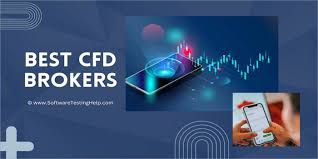
The Best CFD Brokers for 2023: A Complete Guide
Choosing the right broker is crucial for anyone looking to trade Contracts for Difference (CFDs). In the ever-evolving financial landscape, it’s essential to compare features, fees, and services before committing to a broker. In this article, we delve into the best cfd brokers top CFD brokers in the industry, helping you make an informed decision.
What are CFD Brokers?
CFD brokers are financial institutions that provide traders with the ability to speculate on the price movements of various financial instruments without actually owning the underlying assets. CFDs are popular among traders due to their leverage features, allowing the possibility of higher returns, albeit with increased risk.
Key Factors to Consider When Choosing a CFD Broker
1. Regulatory Compliance
When selecting a CFD broker, the first thing to check is whether the broker is regulated by a reputable financial authority. Regulations offer a layer of security, ensuring that the broker adheres to strict operational standards. Look for brokers regulated by authorities like the FCA (UK), ASIC (Australia), or CySEC (Cyprus).
2. Trading Platform
A user-friendly trading platform is a must for successful trading. Most modern CFD brokers offer proprietary platforms alongside popular options like MetaTrader 4 or 5. Ensure that the platform you choose provides essential tools such as live charts, technical analysis features, and compatibility with mobile devices.
3. Fees and Spreads
Trading costs can significantly impact your profitability, making it essential to compare fee structures. CFD brokers typically charge a spread – the difference between the buying and selling price – along with commissions. Some brokers offer zero-commission trading, but make sure to evaluate their spreads to understand the total cost of trading.
4. Range of Markets
The best CFD brokers provide access to a diverse range of markets, including forex, indices, commodities, cryptocurrencies, and stocks. Having a variety of options allows traders to implement different strategies and hedge their positions effectively.
5. Customer Support
Exceptional customer service is another critical factor in choosing a CFD broker. Ensure that the broker you select offers multiple channels for support, including live chat, email, and telephone. Availability of support during trading hours can significantly enhance your trading experience.
Top CFD Brokers for 2023
1. IG Group

IG Group is a well-established broker with a strong reputation in the market. They offer a wide variety of CFDs across different asset classes, a robust trading platform, and educational resources for new traders. Their regulatory compliance with the FCA makes them a reliable choice.
2. Plus500
Plus500 is known for its user-friendly platform and competitive spreads. They do not charge hidden fees, making it a cost-effective option for traders. Their extensive range of products and solid customer support make Plus500 a popular choice among retail traders.
3. eToro
eToro stands out with its social trading features, allowing traders to follow and copy the strategies of successful traders. They offer a variety of CFDs, including stocks and cryptocurrencies. eToro is regulated and provides a demo account for beginners.
4. CMC Markets
CMC Markets is known for its comprehensive trading platform with advanced charting tools and analytics. They offer tight spreads and a wide range of trading instruments. Their commitment to customer service and educational resources makes them an excellent choice for both novice and experienced traders.
Trading Strategies for CFDs
Whether you are a beginner or a seasoned trader, having a solid strategy is essential for success in CFD trading. Here are a few popular strategies:
1. Day Trading
Day trading involves executing multiple trades within a single day to capitalize on short-term price movements. This strategy requires a strict risk management plan and quick decision-making skills.
2. Swing Trading
Swing trading focuses on taking advantage of price swings over several days or weeks. Traders analyze market trends and use technical indicators to identify entry and exit points, often holding positions longer than a typical day trader.
3. Scalping
Scalping is a high-frequency trading strategy where traders aim to make small profits from numerous quick trades. This approach requires a significant time commitment and fast execution capabilities.
Managing Risks in CFD Trading
CFD trading can be risky due to the leverage involved. Here are a few tips to manage risks effectively:
- Use Stop-Loss Orders: Implement stop-loss orders to limit potential losses on trades.
- Consider Position Sizing: Determine the appropriate size of each trade based on your overall capital.
- Avoid Over-Leveraging: While leverage can amplify gains, it can also magnify losses. Use leverage wisely.
Conclusion
Finding the best CFD broker involves thorough research and understanding your trading needs. Whether you’re a new trader or experienced professional, ensure that the broker you choose aligns with your trading style and goals. The broker landscape is continually changing, so staying informed and adapting to new insights will benefit your trading journey.
Be sure to keep an eye on the evolving financial markets and make informed decisions based on current trends, supported by the right trading platform and broker. With the right tools and knowledge at your disposal, you’ll be well on your way to successful CFD trading.